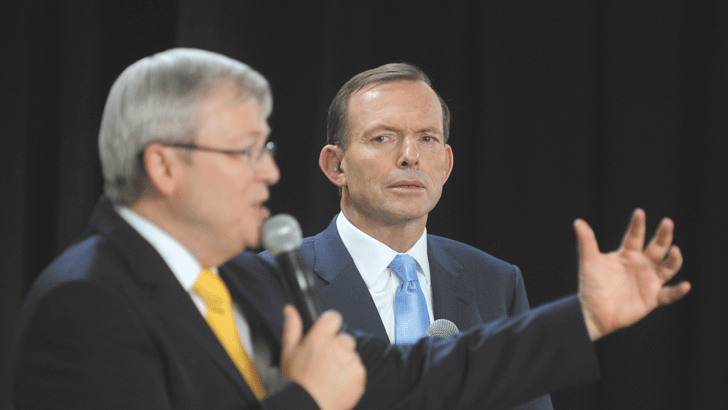What this election should have been about, but wasn’t

Election day is meant to be the day when we get to have our say over the vital decisions that impact our lives – the day we determine the future of the country for the next three years.
The lead-up to election day surely should be a time of great excitement, animated discussions, vibrant debate, of close examination of alternative plans for the future and of mass mobilisation of popular sentiment behind one or another candidate.
Yet for this election, most people are disinterested, bored and cynical. Rather than millions of workers feeling this is a time when they have some say over their lives, they feel disempowered.
They rightly recognise that there is no real choice on offer. Labor and Liberal are but pale imitations of each other. Neither party seriously addresses the key issues impacting our lives, let alone offers genuine solutions to our problems.
Let’s start with the issue that the opinion polls indicate people are most concerned about: jobs. With the winding down of the mining boom and the pitiful level of the dole – just $497 a fortnight for a single person – they are right to be worried.
Other than meaningless rhetoric about the budget deficit and posturing about who is the best economic manager, neither Rudd nor Abbott offers anything on jobs. Both of them accept that an official unemployment rate of 5-6 percent (which significantly understates the real level of joblessness and underemployment) is necessary to ensure that workers don’t become too uppity and demand decent wages.
Yet there is no shortage of work to be done. For starters, the health system is chronically understaffed. There is a desperate need for more staff in emergency wards and more paramedics.
Training and employing more nurses and doctors would dramatically cut the waiting lists for elective surgery. As well, the public health system should be expanded to cover dental care and support services.
Aged care in particular is chronically understaffed and poorly paid. Construction workers losing their jobs on mining projects could build hospitals, health care centres, aged care facilities and many other vital projects.
One glaringly obvious project would be a massive expansion of high quality, low cost public housing. This would both tackle homelessness and put a downward pressure on rents and thus raise living standards across the board.
There are myriad other jobs that construction workers could be employed on – childcare centres, a massive expansion of the rail network, renewable energy projects and new schools. These projects in turn would generate a wave of other jobs – teachers to train the extra nurses and construction workers, factory workers to produce the materials.
None of the parties want to talk about these sorts of initiatives. There is a consensus among the media and the politicians that there is no money for such projects. Yet governments never have any trouble finding billions of dollars to lock up refugees in concentration camps.
In any case, the big banks and the mining tycoons are flush with cash. For decades, Labor and Liberal governments competed to slash taxes on the rich and big business. Australia now has one of the smallest shares of tax paid by companies and the rich of any advanced industrial country. This is another issue that none of the politicians want to talk about.
Why? Because all the major parties – Labor, Liberal and Greens – are committed to maintaining the capitalist system. All of them are committed to boosting profits at our expense.
Vital projects that cut into profits, such as public housing, free health care, free child care and a decent pension, are axiomatically ruled out.
Or take another issue that impacts the great majority of us – the quality of our working lives. For decades, the advocates of the free market and small government like the Institute of Public Affairs have campaigned for government deregulation of big business and greater workplace “flexibility”. This approach has been embraced by both the Liberals and Labor. The core of Howard’s anti-worker WorkChoices legislation remains intact despite six years of Labor government.
And for all the talk by the free marketers of greater individual freedom and ending the “nanny state”, the reality is that there are much greater legal restrictions on what workers can do at work than at any time in the last 100 years.
Under Labor’s WorkChoices-lite, the bosses have been granted “flexibility” to undermine our wages and working conditions and to ensure that basic safety provisions are not enforced.
But if workers object to being bullied or pushed around by some bastard of a boss or are worried about unsafe conditions, they are legally denied the basic right to withdraw their labour.
Even holding a meeting at work is illegal. As for a strike, the labyrinthine rules and regulations that you have to comply with make the idea that we have a legal right to strike utterly meaningless.
Whether Labor or the Liberals win on 7 September, none of this is about to change for the better. We need to change totally the framework of politics in this country so that the rights of workers and the oppressed are put front and centre.